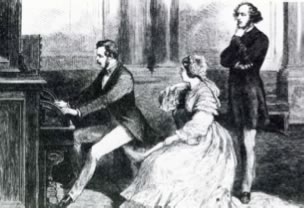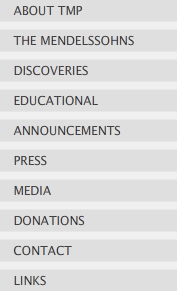



Prince Albert and Queen Victoria with Felix Mendelssohn (standing R)
PIANISTS MISHA AND CIPA DICHTER TO PREMIERE FELIX MENDELSSOHN'S "SEVEN SONGS WITHOUT WORDS" FOR PIANO FOUR-HANDS AT RAVINIA JUNE 20 AND AT ASPEN MUSIC FESTIVAL ON AUGUST 20
Misha Dichter and Cipa Dichter, who have become known for bringing many previously neglected works of the two-piano and piano four-hand repertoire to the concert stage, will perform the world premiere of an unpublished work by Felix Mendelssohn at the Ravinia Festival on Saturday, June 20, followed by a performance of the work on Thursday, August 20 at the Aspen Music Festival. The "Seven Songs Without Words, Op. 62 and Op. 67" for piano four-hands are among more than 270 unpublished works recovered by The Mendelssohn Project.
Mendelssohn began writing his "Six Songs without Words" for solo piano, Op. 62, in 1841 and completed them in early 1844. Soon after at a dinner in London with British novelists Charles Dickens and William Thackeray, the idea was discussed of arranging the Op. 62 songs for piano four-hands and dedicating them to Queen Victoria and her husband Prince Albert, both pianists. His work was nearly finished when he learned that the Queen's favorite song was Meditation from the "Six Songs Without Words," Op. 67. Mendelssohn quickly arranged the work, and on June 9, 1844, presented the "Seven Songs Without Words, Op. 62 and 67" for piano four-hands to Prince Albert with the following dedication (translated from the German).
Your Dignified Royal Highness,
I have taken the liberty to arrange the fifth book of my Songs Without Words for four-hands for You. And now I dare to lay it down at the feet of Her Majesty the Queen and Your Royal Highness; I have used hints of Czerny's facile arrangement style etc. as well as I could, and have even exceeded my predecessor at least with respect to one point, I have enclosed a still unpublished seventh Song for four-hands. May the composer be credited for what the copyist may have lacked here and there - and vice versa! May Your Royal Highness sometimes play parts of it and consider it as evidence of my heartfelt gratitude for the gracious accommodation and the unforgettable hours that You let me share during my stay last week.
Always, Your Royal Highness, most sincerely
Felix Mendelssohn Bartholdy
In addition to their world premiere performance of Mendelssohn's "Seven Songs Without Words" at Ravinia, the Dichters will play Dvorak's 5 Legends and Liszt's Concerto Pathetique for two pianos. The Ravinia program will also include Schubert's Sonata Op. 143 and Beethoven's Six Bagatelles, Op. 126 by Mr. Dichter.
In Aspen on August 20 the Dichters will also perform Shostakovich's Concertino for piano four-hands, Mozart-Busoni's Fantasia for Musical Clockwork and Liszt's Concerto Pathetique for two pianos, and the first movement of Shostakovich's Babi Yar Symphony for two pianos with baritone and male chorus. The Dichters performed the world premiere of the first movement of the Babi Yar Symphony at the Museum of Jewish Heritage in New York in 2006.
Pianists Misha and Cipa Dichter met at The Juilliard School as students of the legendary Rosina Lhevinne and made their first joint appearance at the Hollywood Bowl in 1972, four years after their marriage. Since then, they have performed recitals in all major cities of the U.S. and Canada, made appearances with the symphonies of Chicago, Los Angeles, Baltimore, Cincinnati and Pittsburgh, and have performed abroad in the music capitals of France, Germany, Holland, Spain, and Switzerland. The Dichters gave the world premieres of Robert Starer's Concerto for Two Pianos and the first movement of Shostakovich's two-piano version of Symphony No. 13 (Babi Yar).
The Dichters' first recording-a three-CD album of the complete piano works for four hands by Mozart plus four-hand arrangements by Busoni and Grieg, which was named by Music Web International as a 2005 "Record of the Year"- is available from Musical Heritage Society.
Born in 1945 in Shanghai, where his Polish parents had fled at the outbreak of World War II, Misha Dichter came to Los Angeles with his family at the age of two and began his piano studies a few years later. While still a student at Juilliard, he launched his international career with a stunning triumph at the 1966 Tchaikovsky Competition in Moscow.
The Mendelssohn Project, an international foundation established by Stephen Somary in 2004, is dedicated to reacquainting today's society with the music of Felix Mendelssohn and his sister Fanny Mendelssohn Hensel and to providing the public with a complete picture of their lives, compositions, letters, and artworks through CDs, concerts, books, film, theatre, and other media. Before the campaign of vilification by Richard Wagner and German Nationalists, Mendelssohn, a brilliant composer, performer, and leading figure in European cultural life, was considered the most influential and respected musician of his time. More information is available from www.themendelssohnproject.org.
